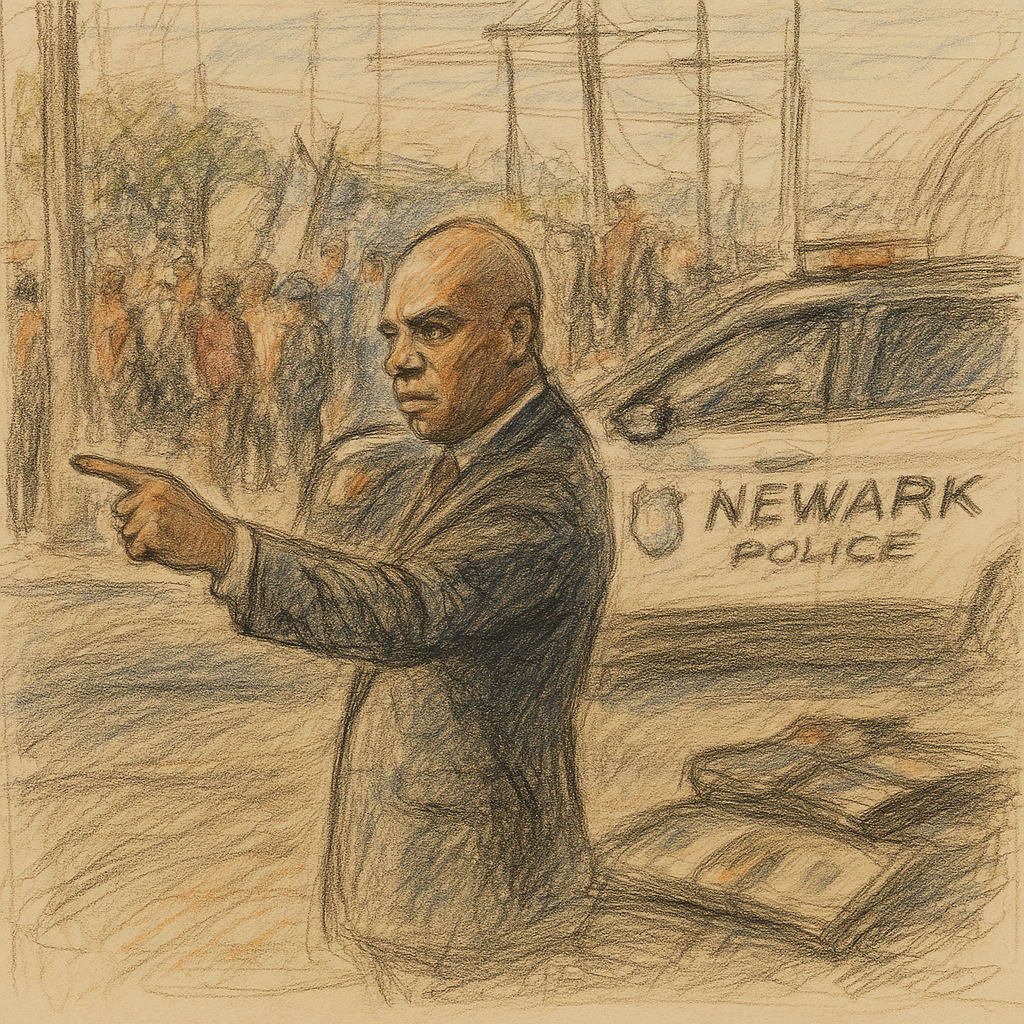When Tyranny Knocks, Will Comfort Answer?
The recent ICE arrest of Newark Mayor Ras Baraka was not merely a political stunt; it was a litmus test. It tested who still possesses the courage to name injustice when it does not directly impact them, and who will risk proximity to power, funding, or comfort to defend someone being publicly humiliated for daring to lead with clarity and conviction.
Sketch of Newark Mayor Ras Baraka
This was no simple misstep by a rogue agency. It was a flagrant attempt to destabilize a Black mayor known for standing with his people, not over them. Yet, the silence from many corners has been more deafening than the act itself.
Let me be plain: we are living in a time where those who speak truth to power are being targeted with surgical precision, and too many of us are too busy protecting our brands to open our mouths. But the truth? It requires bravery, not branding.
While this moment is national, it carries implications in every local space where injustice festers quietly in corner offices, under the glow of HR policies, and behind the language of "team fit" and "professionalism." The same lack of courage that allowed ICE to arrest Mayor Baraka without mass pushback is the same lack of courage that keeps people quiet in the workplace when they witness harm.
We have learned to code-switch our values, to tone down our outrage, and to buffer our beliefs for the sake of maintaining access. But what are we truly accessing if it demands silence in the face of bigotry, trauma, and harm?
I have watched brilliant people whisper about the violence they see in their offices; not physical violence, but emotional violence. The kind where colleagues bleed on others from their own unaddressed wounds, where unresolved trauma trickles down through meetings and manifests as micromanagement, sabotage, passive aggression, or outright gaslighting. And people say nothing, not because they agree, but because they are afraid.
They fear losing status, being labeled "difficult," and becoming the next target. That fear is real, but so too is the damage caused by our inaction. Moral clarity will always carry a cost, yet moral confusion costs far more.
Workplaces are filled with people who possess titles but lack integrity, strategies but no soul, and diversity statements devoid of accountability. We profess to care about mental health, inclusion, and safety, but when someone causes repeated harm, we send them to training and leave the harmed to pick up the pieces.
We must name what is happening: organizational complicity is a form of tyranny. It may not resemble an ICE arrest, nor may it make national headlines. However, every time a leader overlooks trauma, every time we excuse someone’s destructive behavior because they bring in money or have tenure, and every time we tell someone to "be the bigger person" instead of addressing root harm, we are allowing a different kind of authoritarianism to thrive, one dressed in policy, one hiding behind protocol.
Paulo Freire illuminates the idea that the process of liberation demands transformation on both sides. The oppressed must reclaim their agency, and the oppressors (the privileged, the insulated) must surrender the false safety that silence offers. This includes those of us who enjoy the comforts of positional power or social acceptance.
And this is the part people often forget: discomfort is the beginning of freedom, not the polished, Instagrammable kind, but the gritty, unfiltered kind that requires you to risk being misunderstood, to give up your seat at the table, and to lose friends, opportunities, and favor. For what you gain is far more valuable: alignment, integrity, and liberation.
If you are in a position of influence, in your workplace, your faith community, your academic space, or your nonprofit boardroom, this is your moment to choose who you are, not just in theory, but in practice.
Mayor Baraka’s arrest is a symbol, but it is also a mirror. Who are you in this story: the person calling it out, or the person saying, “It’s not my place”? Because if a Black mayor, in a Black city, can be targeted in this manner, what makes you think your silence will save you? And more importantly, what does it cost the rest of us while you remain quiet?
Call to Action:
Break the silence: Speak out not only about national injustice but also about the spaces where harm hides behind professionalism.
Audit your behavior: Are you perpetuating harm by excusing it? Are you more invested in comfort than in community?
Stand up at work: Advocate when you see inequity. Do not let someone’s trauma be minimized because it makes leadership uncomfortable.
Practice reflective leadership: If you hold power, ask how you are stewarding it. Are you healing, or are you bleeding on others?
Build a courageous culture: Create systems where truth is welcomed, not punished, where feedback is met with growth, not gaslighting.
Join the collective roar: The time for quiet resistance is over. What we need now is aligned, unapologetic, grounded courage.
Liberation is not passive; it is active and relentless. It is most powerful when we stop waiting for someone else to lead and decide, once and for all, that the stand begins with us.

